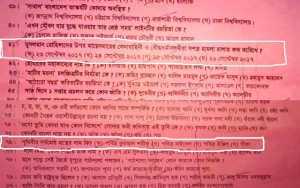Recently there has been a storm of protest in the social media against a question on a test for admission to Rajshahi University in Bangladesh. The participants in the protests are mostly Bangladeshis at home and abroad.
Here is a copy of a part of the test, courtesy of bdnews24.com
While many of the questions are worthless in terms of evaluating the aptitude of students, the question that got the protests is question #76. It asks, "What is the name of the greatest book on Earth"? The answers, translated literally from Bangla to English, are a) Holy Koran, the honorable, b) Holy Bible, c) Holy Injil and d) Gita.
So, according to the university that gave the test to the prospective students, the Koran is holy and honorable; the Bible is holy; the Injil is holy; and the Gita is just a book, not necessarily holy. The correct answer, as marked in the picture above is "a", where the Koran is not only holy, it is honorable too! And why not, something that is holy and honorable has to be better than what are just holy and than what is not declared as holy, right?
For people who might not know about these books, they are as follows:
The Koran is the principal book of Islam, and it contains what is believed by Muslims to be God's messages through Mohammad. The Bible is the principal book of Christianity, and it contains what is believed by Christians to be God's messages through Jesus Christ. There is no book called "Injil". However, Injil is believed by the most puritanical believers of Islam to be a collection of messages that God sent to Earth through Jesus, who is called Isa in Islamic religious books and is recognized as a prophet (messenger) of Islam before the last prophet, Mohammad. The Gita is a principal book of contemporary Hinduism. It contains words from Krishna, who is believed by Hindus to be one of the avatars (reincarnations) of God on Earth. Technically, Krishna is God himself (in human form), and Mohammad and Jesus are his messengers!
So, looking at the honest perspectives of the students, what would be the correct answer to the question? Answer "a" would be the correct one for Muslim students. Answer "b" would be the correct one for Christian students. Answer "d" would be the correct one for the poor Hindu students; poor, because their holy book is not even declared holy in the question! And what about Buddhist and other atheist and agnostic students? Well, let us just say that they would be confused.
Of, course, in the country that is seriously spoiled by Islamic fanaticism, all students would probably choose answer "a", with the non-Muslim students realizing that their honest answer would go against their purpose of getting admitted to the university. But, surely, the non-Muslim students would feel insulted and intimidated after doing that. How about the fanatic Muslim students? They are likely to dig deeper into their cocoon of Islamic fanaticism and hatred against non-Muslims.
By this question, Rajshahi University has clearly discriminated against non-Muslim students seeking admission there.
However, while a lot of people in social media, like Facebook, have expressed condemnation and disgust for this question in the admission test, there is no news of anyone or any organization suing the university for discriminating against non-Muslim students.
While criticizing the holy books and characters of Islam is dangerous in Bangladesh, taking tangible actions for stopping discrimination against non-Muslims probably is not. So, shouldn't organizations like Hindu Buddhist Christian Unity Council take Rajshahi University to court in Bangladesh for a tangible action to punish the hate-mongers who wrote and approved the question? The university cannot be absolved of the responsibility of allowing this question in the test, and should be made to pay compensation to the students who were insulted, intimidated, aggrieved and disadvantaged in the admission test.
